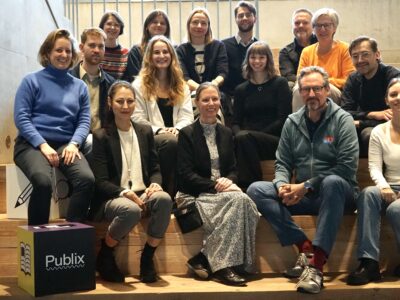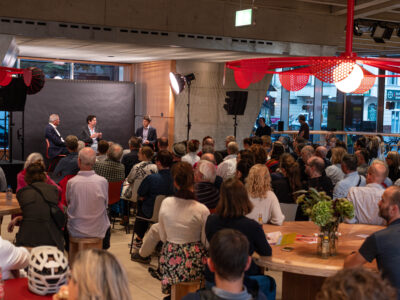Guest contribution: Learning from the USA
Donald Trump, of all people, has managed to win over the very immigrants that his democratic opponents neglected. With new elections in Germany not far off, it is imperative for its political actors to strengthen social cohesion as well as trust in formal institutions.
By Laura-Kristine Krause

Laura-Kristine Krause is the founding director of More in Common Germany, one of the organisations to which the Publix building in Berlin is home. As a World Fellow at Yale University, she is currently researching social conditions in the US.
Election campaigns have certain unwritten rules in terms of what will secure victory versus what will actively harm a campaign. Slurs levelled against women and immigrants, private scandals, and criminal convictions would usually be catastrophic for candidates, but none of these laws seem to have applied to Donald Trump. Following a long campaign that took several twists and turns, and which cost billions to run, he was once again elected US President on 5 November 2024. Contrary to the predictions of the most recent polls, it wasn’t even a close race.
While Trump’s status among his followers is akin to that of a cult leader, his victory is down to more than the personality of the man himself. I have been directly following the elections here in the US since August, and it is clear to me that the social dynamics, which fuelled the success of the Trump model can equally be found in other Western democracies. We are constantly confronted with them in our work at More in Common. Indeed, they equally determine whether or not anti-democratic populists are able to secure major electoral successes here in Germany. We would thus do well to look with concern and humility at events in the USA.
At More in Common, we examine social cohesion in Germany. We try to determine who is actively involved, who goes unseen, and how those people can be reached. In order to do so, it is important to keep an eye on the pace of social change and the changing aspirations of different social groups. In the US, new and acute social conflicts have dislodged a number of historical certainties in terms of voting demographics. Previously, the children and grandchildren of immigrants constituted part of the democratic party’s core electorate. Yet, most Latino men voted for Trump in this election, despite his condescending and discriminatory comments about them. The same is true of Arabs and Muslims, whose vote was also affected by the conflict in the Middle East. Trump’s campaign devised targeted messages aimed specifically at these groups. Only four years ago, during the Corona pandemic, the US working class believed Joe Biden would bring them a better future. Now Donald Trump has capitalized on prevailing inflation to secure those working-class votes with a similar margin to his predecessor.
German political parties must be sure to do more than simply addressing the shrinking ranks of their own members and regular voters. They need to strategically acquire voters in new demographics, including those with migration backgrounds, without treating them, as occurred in the US, like one unified group. The only party to systematically do so here, on social media at least, is the AFD. During the European elections, they created Turkish-language content to directly target young Turkish Germans on TikTok.
Fundamentally, Trump’s campaign fed on two phenomena: dissatisfaction with the present and a longing for change. He seized on the emotional state of his voting base and promised such people a better future. Despite being an elderly ex-President, Trump managed to position himself as representing the change that Americans so clearly desire. Kamala Harris, on the other hand, was the embodiment of the status quo, not least because she did not adequately distance herself from the incumbent, Joe Biden. In Germany, the Alternative for Germany (AfD) and the Sahra Wagenknecht Alliance (BSW) have been employing a similar strategy. Despite the diversity in the content of the political spectrum in Germany, they each claim that the remaining parties are all the same, portraying themselves as the only viable alternative.
Social cohesion depends on two axes of trust: people’s trust in democracy itself, and their trust in one another. Once trust has come under attack, it is very difficult to repair. In 2016, those Republicans that voted for Trump did so while virtually holding their nose. They accepted his reprehensible methods for the sake of the party’s popularity, and they did not object to his false claims about his defeat in the 2020 election. Four years later, a third of the US population firmly believes that the 2020 elections were manipulated, and that Joe Biden was not legitimately elected, which is a perverse reversal of concern for democracy. Trumpism has now won, and moderate republicans have lost their political home. The motto, “party before country”, has done little for them. It may seem idealistic to say so but political actors in Germany should recoil at the very notion of weakening trust in democratic institutions in the name of short-term party gains.
What has most struck me about this round of US elections was the erosion of people’s trust in one another. They didn’t just seem divided, they seemed to have lost their voice altogether. People didn't put up campaign signs because they were afraid to talk to their neighbours about the election. Families, work colleagues, and friends don’t discuss political issues anymore. This not only separates them out in their world views, it prevents them from perceiving “others” or “them” primarily as people. There is a real danger of the same thing occurring in Germany unless we manage to organise beyond the lines of social division, to achieve greater social visibility, and to secure access to shared sources of information. To achieve this, politicians must ensure that certain conditions are in place, such as by providing solid support for public broadcasting, in stark contrast to what is currently being planned by the regional governments. They must also be exemplary in their own behaviour, given that whoever dehumanizes their political opponent – as we have seen in the harsh rhetoric levelled against the Greens – weakens democratic culture itself.
As recent polls show, we are not immune to the successes of authoritarianism here in Germany. The early federal elections in 2025 will give us an opportunity to show that we have learned from the failures of the US.
Fotocredit: Carolin Weinkopf


